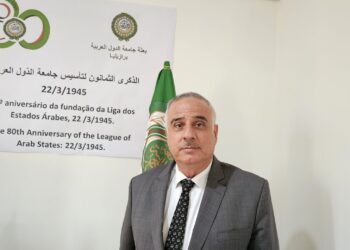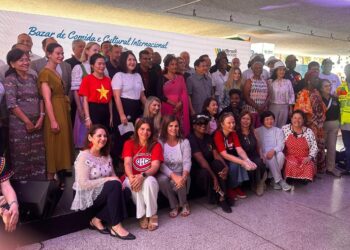Relations between Brazil and Kuwait are increasingly promising. In half a decade, they exchanged about $ 1 billion in exports.
| Oda Paula Fernandes
Fotos: Eliane Loin

“Allow me to take this opportunity to reiterate the ongoing zeal of the Kuwaiti State for promoting relations with Brazil and to express my deep appreciation for sharing this opportunity with us,” said Ambassador Ayadah Alsaidi.
Brazil has had diplomatic, political and business relations with Kuwait since 1968, and in 1975 the two countries already had embassies. According to the head of the Middle East Department, the ambassador, Lígia Maria Scherer, in 2018 complete 50 years of diplomatic relations, with many visits and exchange of more than US $ 1 billion in exports, since 2012. “But it can be even more stimulated because they are two countries that have great complementarity. We are always analyzing instruments and mechanisms to bring us closer together. The Ambassador in Brazil is very active, very dynamic, experienced in the areas of commercial promotion and investments in Brazil, and still having great experience and interest in the cultural aspect. These are excellent opportunities for both countries, “says Scherer.
Strategically well positioned and, given by nature with one of the largest oil fields in the world, the country has as an ally the US. Located on the top of the Gulf, surrounded by neighbors such as Saudi Arabia, Iran and Iraq, Kuwait stands out from the other Gulf monarchies for being the most open to the political system. This creates tensions between parliament and the cabinet – controlled by the family Al-Sabah – thus, the government is under pressure for calls for radical political reform.
Were present at the event, as the ambassador guests of honor, the Minister of Sports, Leonardo Carneiro Monteiro Picciani, Minister of Labor and Employment Ronaldo Nogueira Oliveira, Ministers of Transport, Ports and Civil Aviation Maurício Quintella Malta Lessa, Justice José Levi Mello do Amaral Jr., the undersecretary general of Africa and the Middle East, Ambassador Fernando José Marroni de Abreu, the head of the Middle East Department, ambassador Lígia Maria Scherer.
Meet Kuwait – In the nineteenth and twentieth centuries, until the 1990s Kuwait’s economy was based on the extraction of pearls, one of the most abundant trades in the world. About 700 boats, used by 1,500 men involved with diving for pearl extraction. Out of the pearl season pearl traders used ships to trade for long distances.
The result was a growing economy in the local naval industry. However, fishing was the least exploited activity in the region. With this, the people were divided between a class of very rich merchants and the population, which did not belong to the royal family, very poor.
Economy – In Kuwait everything is of great proportions. After an imminent collapse, oil was discovered only in 1983, and since the post-war oil exportation the local economy has had one of the highest incomes in the world. Evaluated at 96 billion barrels, the country’s oil reserves represent about 10% of the world. Kuwait has the world’s fifth largest oil reserves and oil derivatives now account for 95 percent of export earnings and 80 percent of the country’s government income and 50 percent of gross domestic product.
In addition, 50% of the Gross Domestic Product (GDP), 95% of export revenues and 80% of government income, comes from oil. The climatic conditions do not allow the development of agriculture and save the fish, the country imports everything that eats and even the water is carried, or distilled. Kuwait’s economy is controlled by the government that controls the oil industry.
History – Kuwait, officially the State of Kuwait, is a sovereign Arab emirate situated in the northeast of the Arabian Peninsula in Western Asia. It borders Saudi Arabia to the south and north to Iraq. It places on the northwest coast of the Persian Gulf. The name Kuwait is derived from the Arabic “akwat”, the plural of “Kout”, which means “fortress built near water”. Historically, the region was known as Caracena, a large port for trade between India and Mesopotamia. The members of the Bani Utbah tribe were the first permanent Arab settlers in the region and established the modern bases of the emirate.
In the 19th century, Kuwait was under the influence of the Ottoman Empire and after World War I, it emerged as an independent market under the protection of the British Empire. Large oil fields in the country were discovered in the 1930s. After Kuwait conquered independence from the United Kingdom on February 25, 1961, the country’s oil industry recorded unprecedented economic growth. In 1990, Kuwait was invaded and attached by neighboring Iraq. The seven months of Iraqi occupation came to an end after direct military intervention by the US-led forces.
Kuwait is a constitutional monarchy with a parliamentary system of government having the City of Kuwait as the political and economic capital of the country. Kuwait has the eleventh largest GDP on the planet and the highest human development index (HDI) in the Arab world. Kuwait is classified as a high-income economy by the World Bank and is designated as a major non-NATO ally of the United States.
Kuaite celebra Data Nacional em Brasília
Relações entre Brasil e Kuaite são cada vez mais promissoras. Em meia década, trocaram cerca de US$1 bilhão em exportação.
O Embaixador do Estado do Kuaite no Brasil, Ayadah Alsaidi, recebeu, na noite desta terça-feira (21), para um jantar, representantes do governo brasileiro, do corpo diplomático, amigos, familiares e imprensa para celebrar a Data Nacional do Estado do Kuaite. A festa comemorativa do 56º ano de independência e do 26º aniversário de libertação foi realizada no espaço Hípica Hall, em Brasília.
“Permitam-me aproveitar esta ocasião para reiterar o permanente zelo do Estado do Kuaite pela promoção das relações que matem com o Brasil e para expressar meu profundo agradecimento por compartilhar conosco esta ocasião”, disse o embaixador, Ayadah Alsaidi.
O Brasil têm relações diplomáticas, políticas e de negócios com o Kuaite desde 1968 e em 1975 os dois países já tinham embaixadas. Segundo a chefe do Departamento do Oriente Médio a embaixadora, Lígia Maria Scherer, em 2018 completam 50 anos de relações diplomáticas, com muitas visitas e troca de mais de US$1 bilhão, em exportação, desde 2012. “Mas pode ser ainda mais estimulada essa relação porque são dois países que tem grande complementaridade. Estamos sempre analisando instrumentos e mecanismos para nos aproximar. O embaixador no Brasil é muito ativo, muito dinâmico, experiente nas áreas de promoção comercial e investimentos no Brasil, tendo ainda grande experiência e interesse no aspecto cultural. São excelentes oportunidades para ambos os países”, comemora Scherer.
Estrategicamente bem posicionado e, presenteado pela natureza com uma das maiores jazidas petrolíferas do mundo, o país têm como aliado os EUA. Localizado no topo do Golfo, rodeado por vizinhos como Arábia Saudita, Irã e Iraque, o Kuaite se destaca das demais monarquias do Golfo por ser o mais aberto em relação ao sistema político. Isso gera tensões entre o parlamento e o gabinete – controlado pela família Al-Sabah –, assim, o governo sofre pressões quanto aos apelos de reforma política radical.
Estiveram presentes no evento, como convidados de honra do embaixador, o ministro dos Esportes, Leonardo Carneiro Monteiro Picciani, o ministro de Trabalho e Emprego Ronaldo Nogueira Oliveira, os ministros dos Transportes, Portos e Aviação Civil Maurício Quintella Malta Lessa, da Justiça José Levi Mello do Amaral Jr., o subsecretário geral da África e do Oriente Médio o embaixador Fernando José Marroni de Abreu, a chefe do Departamento do Oriente Médio a embaixadora Lígia Maria Scherer.















































